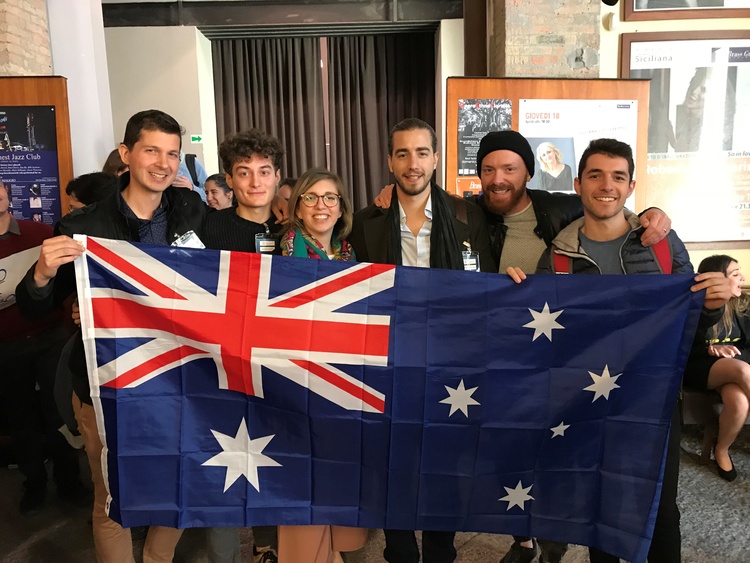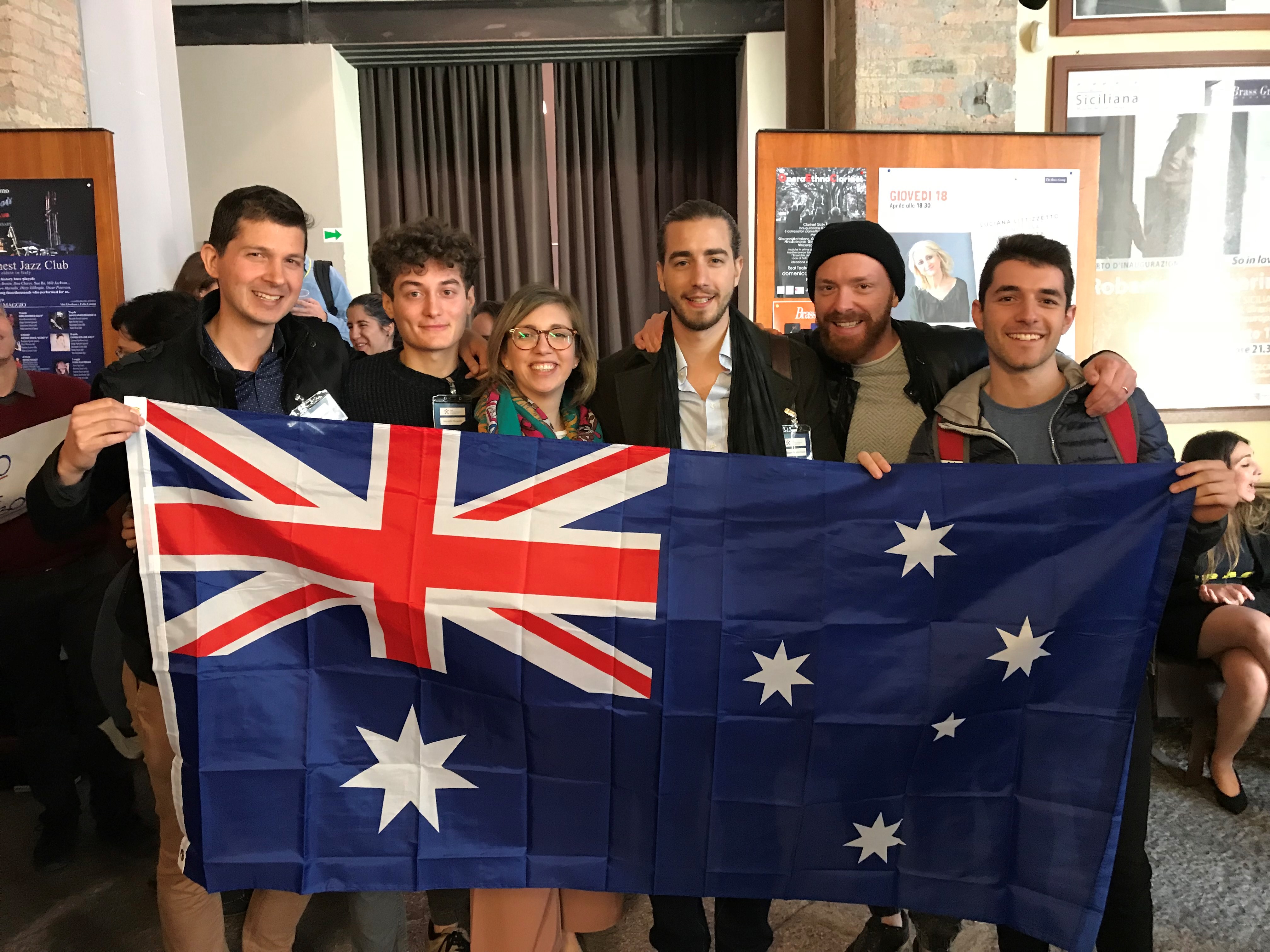The seminar was organised by the General Council of Italians Abroad (CGIE).
Delegates were selected from the cities of Brisbane and Melbourne to represent the Italo-Australian community.
Those chosen by Com.It.Es. Victoria and Tasmania were: Chiara De Lazzari, 31, Nicholas Musto, 22, and Fabrizio Venturini, 32.
In the following interview with Il Globo, the trio shared experiences of the event, and how they hope to implement the idea of a global Italian network in their local community.
Why did you wish to attend the conference for Italians in the world?
CDL: The reason I wished to attend this conference was to engage with the wider Italian community abroad and actively participate in this initiative that could potentially benefit the Italian community in Melbourne through the creation of an international network of young Italian citizens living abroad.
NM: The most obvious answer would be “because I am a second-generation Italian who is very proud of his heritage”, and I have no doubt that that is why many of us attended the conference. However, I also felt it a good opportunity to extend my connections a little more, not only across the globe but, within the Italian community of Melbourne: I had only ever heard of the Com.It.Es. once before handing in my expression of interest and, therefore, thought that it may be a great opportunity to get to understand the association a little more, while making my contribution to the network of young Italians throughout the world.
FV: I truly believed that the Seminario di Palermo was a unique opportunity for all Italians abroad, and not just the youngest, to understand the strength of the Italian “soft power”. Specifically the CGIE is targeting the problems that are affecting the new flow of Italian migrants and, as a “community leader”, I felt that I had to play my part.
What was your response to the selection question: “Why you are passionate about being Italian?”
CDL: I have developed my passion for the Italian community in Australia through my research and studies since I have conducted my PhD on the Italian external voting and dual citizenship rights. In light of my research interests, I had the possibility to engage with the Italian community in Melbourne and learn about the peculiarities of the Italian diaspora in Australia and elsewhere.
NM: I have always been very passionate about my heritage as well as my language, however, going over to Italy and completing a semester on exchange only strengthened my connection with this portion of my ancestry. Therefore, my response to this question was that my pride pushes me to share the wealth and beauty that I have inherited from my family, as well as my semester [on] exchange, with others; whether it be the language, literature, music or even food.
FV: Asking me why I am so passionate about being Italian is literally like asking me why I am so passionate about being myself: shouldn’t I be?
Can you tell us about your Italian background and when/why you moved to Australia (for those born in Italy)?
CDL: I am originally from Treviso (Veneto). I came to Melbourne for the first time in 2011 for six months as an exchange student while I was completing my Masters Degree in International Relations. I moved to Australia in 2013 because I was awarded a scholarship from Swinburne University of Technology to conduct my PhD research.
NM: My maternal grandparents, and paternal grandmother, all originate from the Catanzaro province of Calabria. My paternal grandfather, however, originates from a small town in the province of Avellino, in Campania. My parents came over to Australia with their parents during the 1960s and 1970s. I was born and raised in Australia but have always had a rather profound connection with my heritage as I have spoken the Calabrian dialect from a young age. My story is the classic second-generation Italian story in which my grandparents were hard-working people who came over to Australia to “make a better life for us”, however, throughout the years I’ve begun to detach myself from the stereotypical Italian-migrant discourse and enrich my heritage in different ways.
FV: I’m from Rome and I moved in Melbourne five years ago.
What kind of work do you do? Do you think your future work will involve Italy or the Italian language?
NM: I have recently completed my Bachelor of Arts with Honours in Italian Studies at La Trobe University (Bundoora). In 2018, I worked as an Italian language assistant at a primary school in Eltham and I am currently working as an English language assistant at a scuola elementare/media in a small town in the province of Brescia. As it has always been my goal to migrate to Italy, I am looking to use this opportunity, as an English language assistant, in the hope that it is a step in the right direction in establishing a life for myself in Italy. Interestingly, at the seminar in Palermo, we spoke quite extensively about Italians who have emigrated from Italy but little about Italians wanting to immigrate back to the Belpaese.
You had to choose to attend one of three workshops at the conference. What workshops did you choose?
CDL: I decided to attend the Research and Innovation workshop since this is my field of work and I was thrilled to meet many other colleagues, PhD candidates and established researchers, in various fields of research that are contributing with their skills to develop research abroad in humanities and hard sciences.
NM: I chose the workshop ‘Le reti della Ricerca e dell’Innovazione italiana nel mondo’ [Research and Innovation]. Being a post-graduate and having had a taste of the world of academia, research, research papers and lectures, I saw an opportunity to explore more of this world outside of an English context. I found some of the ideas of the workshop interesting, however, most of it seemed to sway off topic in regard to the creation of a “network of young Italians”; in this case, young Italian researchers.
FV: I chose the ‘Ambasciatori del patrimonio italiano nel mondo’ [Ambassadors of Italian Heritage in the World] workshop. It was a great opportunity to understand the value of our heritage.
Did you make new friends?
CDL: There was a very positive atmosphere at the event and I had the opportunity to meet colleagues. Of course, after spending four days together we had the opportunity to get to know each other very well and I am sure some of us will be in touch after the congress and maybe visit each other’s countries. Moreover, it was very nice to know the other delegates coming from Australia and I hope there will be the opportunity to develop a stronger network in Australia with the support of the Com.It.Es.
NM: Absolutely. Not only have I made new international friends and connections, I have also made new domestic friends. I didn’t know many of the Australian delegates before departing so it was great to finally meet them over in Italy. A group of us have also tried to branch off and create a network of young Calabrians throughout the world, so I have faith that the connections I have made will not be short-lived ones.
FV: I’ve made not just new friends but also new strong connections all around the world.
Name a memorable moment or something you have learnt from the experience?
CDL: I will always remember the energy and the enthusiasm all the participants shared, and the interest and commitment demonstrated by all the delegates. Most importantly, I was able to witness the passion second- and third-generation Italians have towards the country of their descendants and the Italianess kept alive throughout the generations.
NM: One of my most memorable moments was seeing the Teatro Massimo for the first time. Something about the magnitude of that theatre hit me for a moment, causing me to seriously stop and reflect on where I was and why I was there. At the same time, I heard some traditional Sicilian music being played in the street and I felt a great appreciation for my heritage but, moreover, for my language. I guess in a brief moment I was getting inspiration from many different directions.
FV: I have a few, but I have to say that all of the speeches by Leoluca Orlando, Mayor of Palermo, were memorable.
What will you bring home to tell other Italians living in Australia?
CDL: Following the conversations we had in Palermo, I would like to tell young Italians living abroad to get involved and participate in the activities of the Italian community. If we want to make a difference and have an impact in the community, we need to be actively involved to raise awareness on the evolution of the community and on the importance in participating and engaging with Com.It.Es. in Melbourne and elsewhere.
NM: I really hope I can continue sharing everything I hold dear about my ancestry, my language and my culture with others and help other Italians to understand that they don’t have to feel confined by their linguistic capacity. I know many second- and third-generation Italians either feel a sense of exclusion from certain things or a lack of motivation to include themselves in activities/societies etc. because of their limited linguistic capacity; however, a sense of pride and belonging should not be defined by how many words someone can say in a certain language. Mayor of Palermo, Leoluca Orando, said to us in his opening address of the congregation that “chi viene a Palermo è palermitano” (Whoever comes to Palermo belongs to Palermo). While the validity of this statement may be questionable in some cases, I feel that the idea is a powerful one, as it breaks down linguistic and cultural barriers and inspires a sense of pride into those who would otherwise feel excluded, or want to exclude themselves, from certain things.
FV: It is hard to synthesise in one sentence, but we will discuss every aspect of the seminar in Eureka, Nomit’s [Italian Network of Melbourne] print segment in collaboration with Il Globo [Thursday, May 2, 2019 edition, pg. 36].












